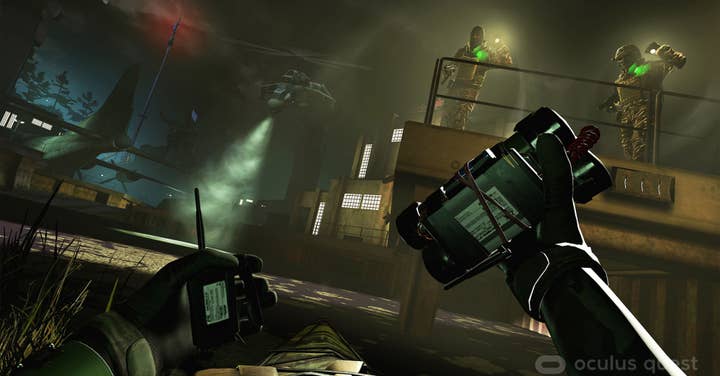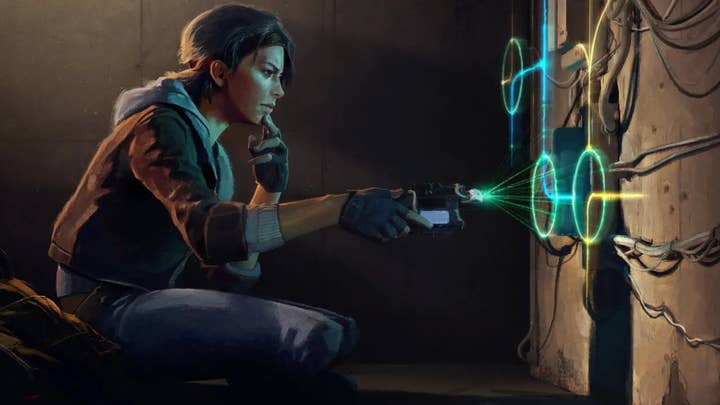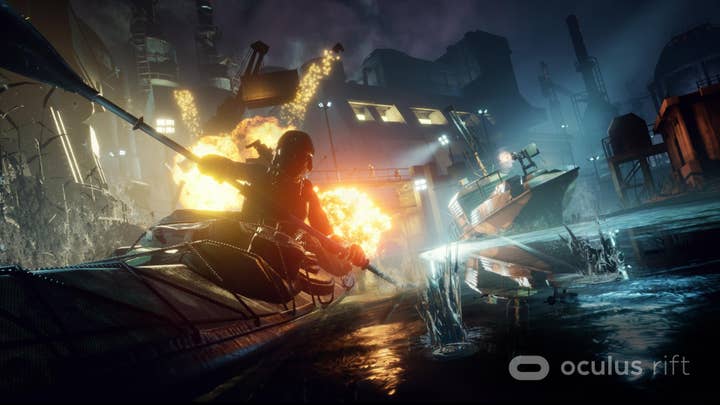"People are returning, and buying new stuff -- that never happened before in VR"
Last year brought the next generation of VR hardware, says Ndreams' Patrick O'Luanaigh, and 2020 will see the same revolution in VR software
Virtual reality has a perception problem. For anyone who has followed the re-emergence of the VR market, it's simple enough to regard it as a fading trend. We have, after all, been analysing its progress for the best part of a decade.
However, there is an illusory quality to that appraisal. There are articles about Oculus VR on this website from 2012, but that was the very start of years of picking apart promises and ideas. As a commercial reality, VR didn't really begin until March 2016, with the launch of the consumer version of the Oculus Rift. I may have been writing about VR for almost a quarter of my entire life, but as a marketplace for games and content, it has only just entered its fifth year.
Ndreams CEO Patrick O'Luanaigh describes the years before the Rift launch as "the Palmer Luckey days" -- an era defined by big acquisitions and "tremendous hype," which created a lasting sense that VR hardware should have been a success from day one. Many working in VR did their part in creating and fuelling that hype, but just as many advised patience with an expensive, evolving technology that simply wasn't ready for mass adoption.
"Sony is one of the few companies to actually announce headset numbers -- which is frustrating"
"They all got the potential that VR had," O'Luanaigh recalls, talking to GamesIndustry.biz after his keynote at the Yorkshire Game Festival. "What they didn't get was that the first VR headset to come out, the DK1, wasn't brilliant. It had a lot of flaws."
Ndreams has always put forward a slow-and-steady philosophy, despite pivoting to VR all the way back in 2013. O'Luanaigh is predictably enthusiastic about the future of the market, and until last year's launch of Oculus Quest, that kind of enthusiasm was often dismissed as wishful thinking. Before then, the market's one unqualified success story was PlayStation VR.
"PlayStation VR has done really well all the way through," he says. "You can look at Sony's sales numbers, and it's one of the few companies to actually announce headset numbers -- which is frustrating... We've got pretty accurate internal estimates [for the size of the entire market] we think, but it's frustrating."
That opacity has been central to VR's perception problem. When the size of the market is obscure even to those who have invested their livelihoods in serving it, one can reasonably ask what there is to hide. For O'Luanaigh, however, what we can see provides enough evidence of progress; Sony confirmed five million sales of PSVR headsets at the end of 2019, and that is just one part of the audience that VR developers can now reach.

Sony has reached that milestone despite PSVR being perhaps the least advanced headset that isn't expressly designed for mobile. The next version of PSVR could be a huge boost for the market, and O'Luanaigh believes that Sony is happy enough with the response from its high-spending core audience to make a second iteration a very strong bet.
"I think Sony knows that, if VR is going to continue beyond the next year or two, they need to update their hardware," he says. "Because it is dated, and it will be even more dated by then. I'd be very surprised if they didn't continue to support VR.
"For me, the Quest is the second generation of VR. Forget all the wires, forget all the complexity"
"But I wouldn't expect it to be announced at the same time as PlayStation 5. This year the focus has to be on the core of the business... so I think they'll be all over PS5 this year, and when that's solid, I think that's when you'll see what they're doing."
However, while new hardware is always welcome, O'Luanaigh believes that the market as a whole is past the "lull" that followed the launch of the Rift, Vive and PSVR -- all of which arrived in a frantic six months in 2016. That all changed in May last year, with the launch of Oculus Quest, the first step on what some believe is a path toward mainstream acceptance.
"In order to understand VR you have to try it, and until the Quest came about -- and until location-based entertainment and VR arcades opened up -- most people couldn't try it," O'Luanaigh continues. "[Headsets] were stuck, cabled to someone's PC at home. The majority of people in the world still haven't tried VR, but the Quest is changing that... It's a much better device for demonstrating.

"For me, the Quest is the second generation of VR. Forget all the wires, forget all the complexity; you just charge it up, stick it on, and it's great. It does six degrees of movement, proper hand-tracking. And that, in two or three years time, will look really old-fashioned as well."
While there are no official sales figures for Quest, there are strong indicators that it has been an accelerant for the VR market overall. Oculus' wireless headset is almost perpetually sold out, and myriad developers have reported the kind of sales milestones that seemed all but impossible in previous years -- Stress Level Zero's Boneworks sold 100,000 units after a week, while Superhot VR earned $2 million in seven days over Christmas 2019.
"From the developers that we know [that have games on Quest]... the numbers over Christmas were phenomenal," O'Luanaigh says. "All the anecdotal evidence we've heard from developers is that it's going really well. People are returning, and playing again, and buying new stuff -- that never happened before in VR... Job Simulator did well, Beat Saber did well, but it wasn't a lot."
O'Luanaigh adds: "If you're smart, and you have a fun game that people like, there is the potential for it to start making money now."
"People are returning, and playing again, and buying new stuff -- that never happened before in VR"
Ndreams has yet to launch a product for Oculus Quest, but its first will be the most ambitious VR game in the studio's history. Phantom: Covert Ops played a prominent role in O'Luanaigh's keynote at the Yorkshire Games Festival, in which he framed it as part of a wave of more ambitious games being made for VR. If 2019 was the year that the hardware reached a new level, 2020 will see the software challenge the idea that the VR space is composed of short, bite-size games that feel like demos.
These are bigger bets, O'Luanaigh says, but the size and the structure of the market now means they aren't irresponsibly risky.
"We're lucky in that we have Oculus Studios supporting us as well -- It really takes some of the risk out of it," he says of Phantom: Covert Ops, which will be an exclusive for Oculus. "But it's also Quest and Rift, it's a very popular genre if you get it right, and because of the reaction we've had all the way through -- it won a lot of awards at E3 last year, and that's really helped.

"It's always a risk, but not too much for us. We're in a position where not all of our money is from selling games. We get supported by some of the hardware companies to push new hardware. That helps to cut the risk."
To some extent, Phantom: Covert Ops has similar goals to Half-Life: Alyx -- which launched last month to rapturous reviews -- or Respawn Entertainment's upcoming Medal of Honor: Above and Beyond VR. All are conscious attempts to shake up the VR software market by being raising the bar on scale and production values.
"VR needs a big enough installed base to justify spending $100 million... But it's getting there"
Valve did so with no pressing need to limit its budget or vision -- a luxury that other studios don't have -- but O'Luanaigh has watched the market closely enough to see an escalating appetite for bigger games. If Half-Life: Alyx is a success, it will simply whet the appetite for AAA products, and bring new players into the ecosystem.
"Will a VR game ever top the All Formats chart in the UK? Well, Blood and Truth got to number one. Will any game sell over one million units? Beat Saber has done two million, so far as we're aware. We're seeing those milestones getting tick, tick, ticked off.
"It's still way too early to be competitive. We need more people playing VR, and what do people want in a VR game? They want to play Red Dead Redemption in VR, they want to play Grand Theft Auto, they want to play Call of Duty -- they want to play the big, epic games that they love.
"Now, not all of those are going to be applicable, but they want that scale, that size of game... that kind of quality, that kind of budget. VR needs a big enough installed base to justify spending $100 million... But it's getting there.
"Half-Life: Alyx is a great example. There was another game, Asgard's Wrath, which we think is $20 million [budget] or more. Blood and Truth has to be $20 million or more. There are some really big bets being made in VR now... and I think you'll see more announced this year -- big IPs coming to VR that haven't been announced before."
"People want to see the games getting bigger and better all the time, and the good news is, that's definitely happening."

